“How to Sue the Klan” Film Features Haub Law Professors and their Groundbreaking Civil Case
The Elisabeth Haub School of Law at Pace University hosted an advanced screening of a new documentary, “How to Sue the Klan,” attended by a packed auditorium of students, faculty, staff and members of the community. The film, inspired by a groundbreaking civil case in 1980 led by Professor Randolph McLaughlin, along with Adjunct Professor Betty Lewis, tells the story of five black women shot in Chattanooga, Tennessee by Ku Klux Klansmen.
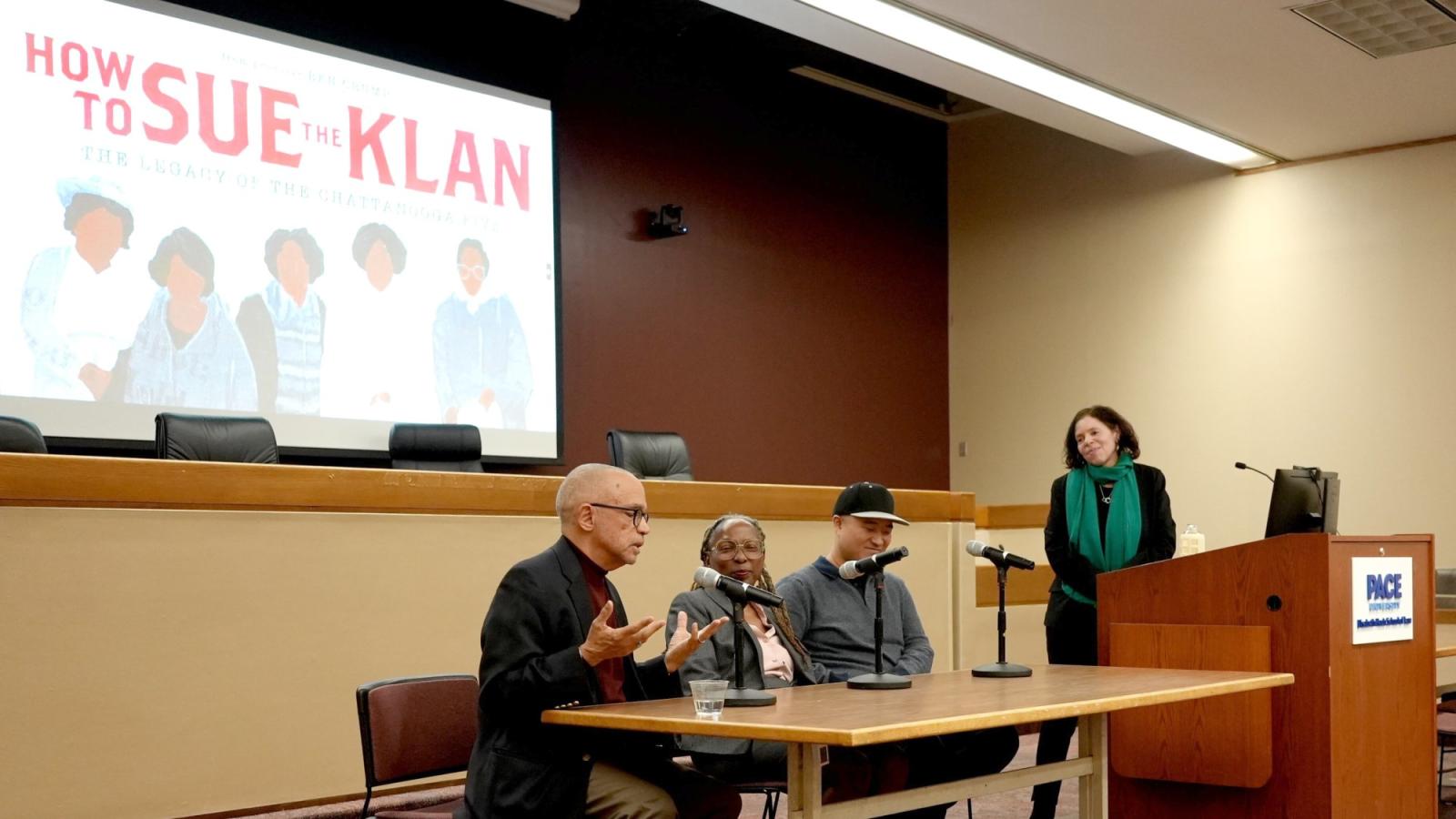
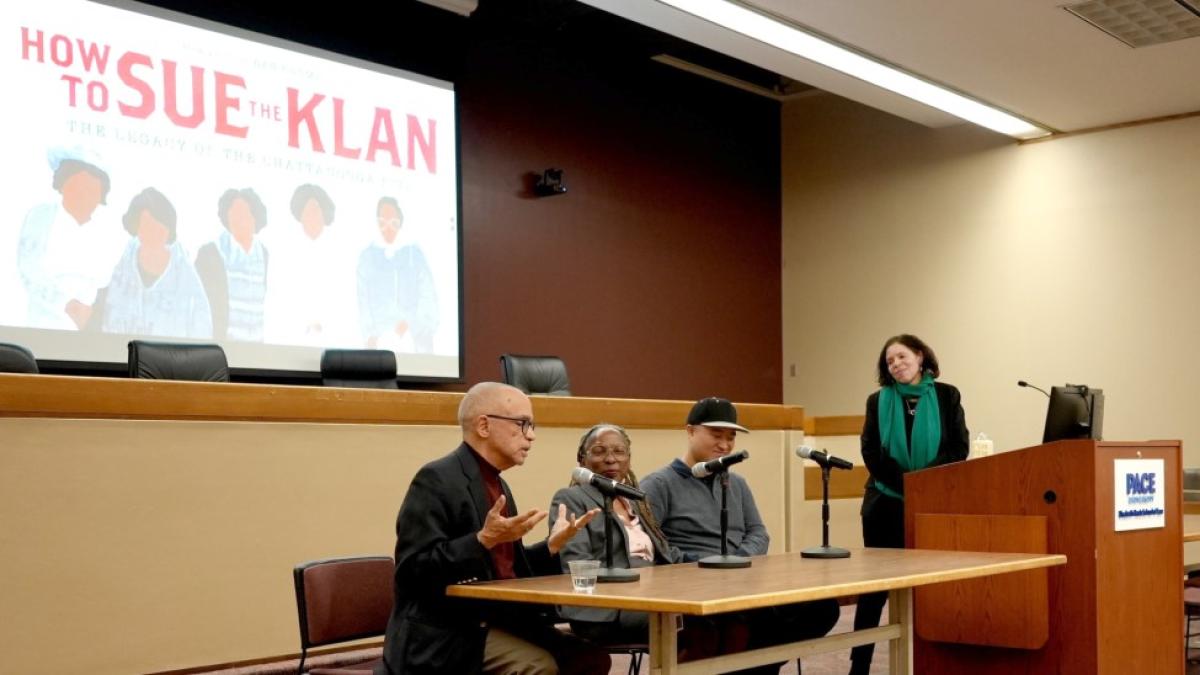
The Elisabeth Haub School of Law at Pace University hosted an advanced screening of a new documentary, “How to Sue the Klan,” attended by a packed auditorium of students, faculty, staff and members of the community. The film, inspired by a groundbreaking civil case in 1980 led by Professor Randolph McLaughlin, along with Adjunct Professor Betty Lewis, tells the story of five black women shot in Chattanooga, Tennessee by Ku Klux Klansmen.
In criminal court, an all-white jury acquitted two of the Klansmen and the third served just six months. Civil unrest followed the verdict, sparking national attention and that of the Center for Constitutional Rights (CCR) in New York City, which had been waiting for the right opportunity to use a new legal strategy against hate groups in civil court.
Haub Law Professor Randy McLaughlin, a CCR attorney at the time, and his legal team which included Adjunct Professor Better Lewis, brought the shooters to federal civil court on behalf of the women. The trial was Professor Mclaughlin’s first in court, and the very first legal case for Professor Lewis. Using incredible legal ingenuity, Professor McLaughlin successfully argued that the women were entitled to compensation based on a post-Civil War law called the 1871 Ku Klux Klan Enforcement Act. It allowed the prosecution of civil rights violations in federal civil court, which meant that survivors could still sue for damages in civil court when the criminal court failed.
They won the case, setting a historical legal precedent that allowed more racial violence cases to be tried in civil courts with the same statute, chipping away at the Klan’s funding and power over time. Today, the precedent set is still used to fight hate in a time when racial violence is again on the rise.
“What we did here was different than any other case against the Klan,” McLaughlin said. “We not only got a damage award, we got in injunction that suspended future Klan acts of violence.”
The film, directed and produced by John Beder and backed by acclaimed Civil Rights Attorney Ben Crump, recently premiered in Chattanooga and is making its way across the country. Haub Law was among the first locations to screen the film, which also included a panel discussion with the film producer and Professors McLaughlin and Lewis. It is the producer’s hope to share this story at law schools and other civic centers across the country to help honor the story of the five brave women who took on the Klan and the significance of what this case has meant for future acts of injustice.
“My hope is that this film will help inspire both lawyers and young people to use their voice against acts of hate and racism,” said Professor McLaughlin. “If everyone does even a small part to fight against injustice like these women did, we can make change in our society.”
What ‘The Bear’ Teaches Us About Leadership And Teamwork
Adversity and challenges are something that everyone must overcome at one time or another, whether you’re a student, a member of a professional organization, or a leader. And “The Bear,” which the TV awards-givers insist on calling a comedy, and many of us see as a sort of family drama, is also providing countless lessons in effective leadership for those who are paying enough attention to see them.
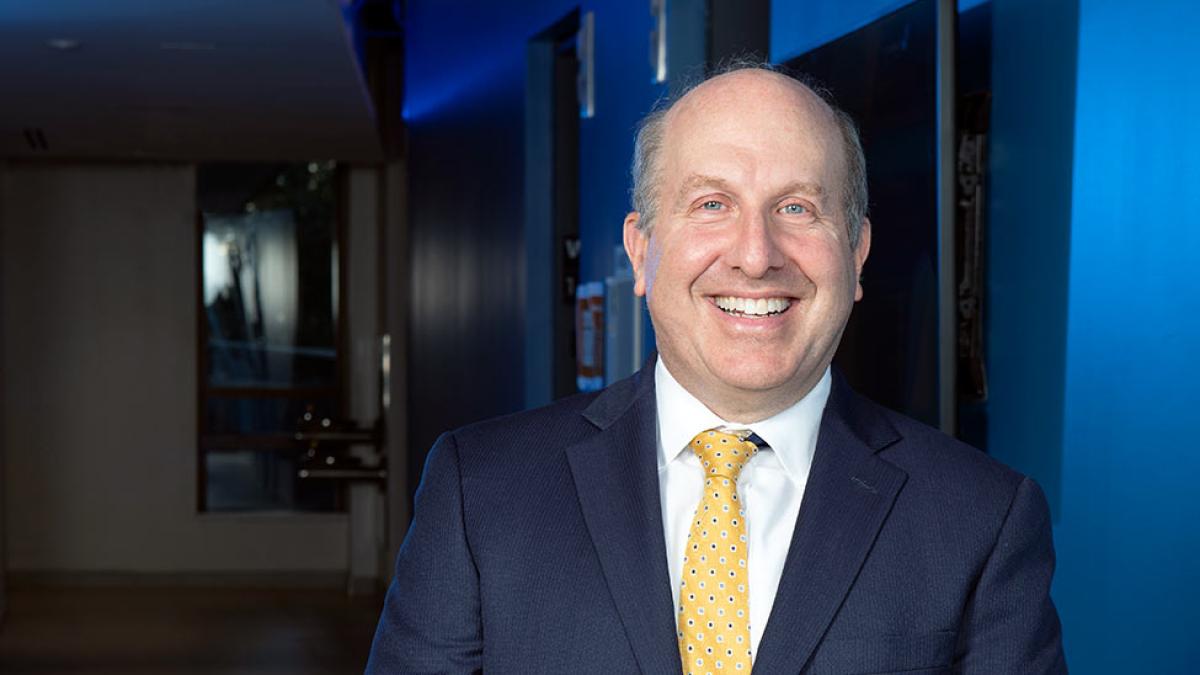
The Elisabeth Haub School of Law at Pace University hosts 36th Annual Jeffrey G. Miller National Environmental Law Moot Court Competition (NELMCC)
The Jeffrey G. Miller National Environmental Law Moot Court Competition (NELMCC), one of the nation’s largest interschool moot court competitions, returned in person for the first time in four years, bringing together hundreds of law students and attorney judges to the Elisabeth Haub School of Law at Pace University’s Westchester campus.
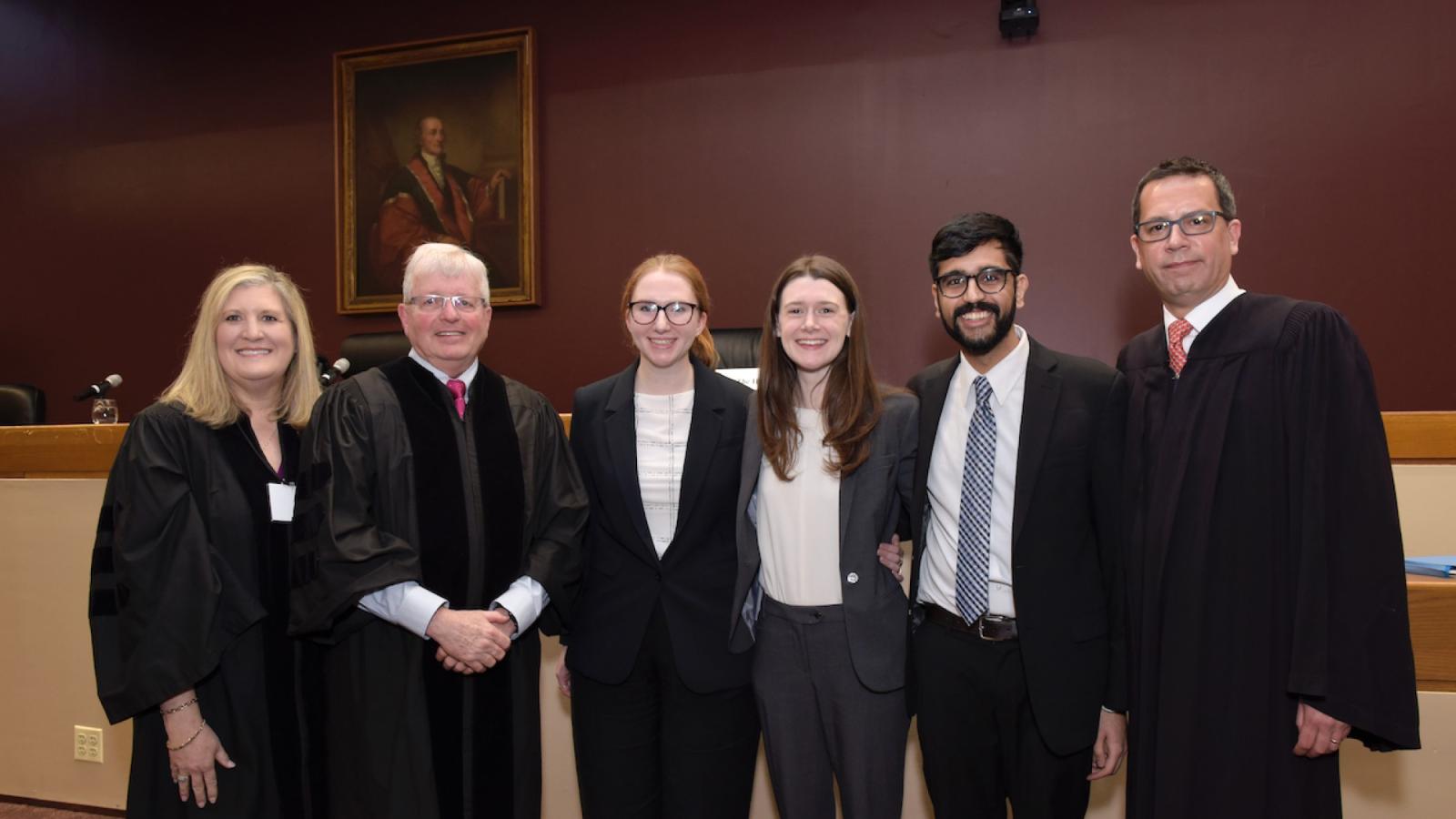
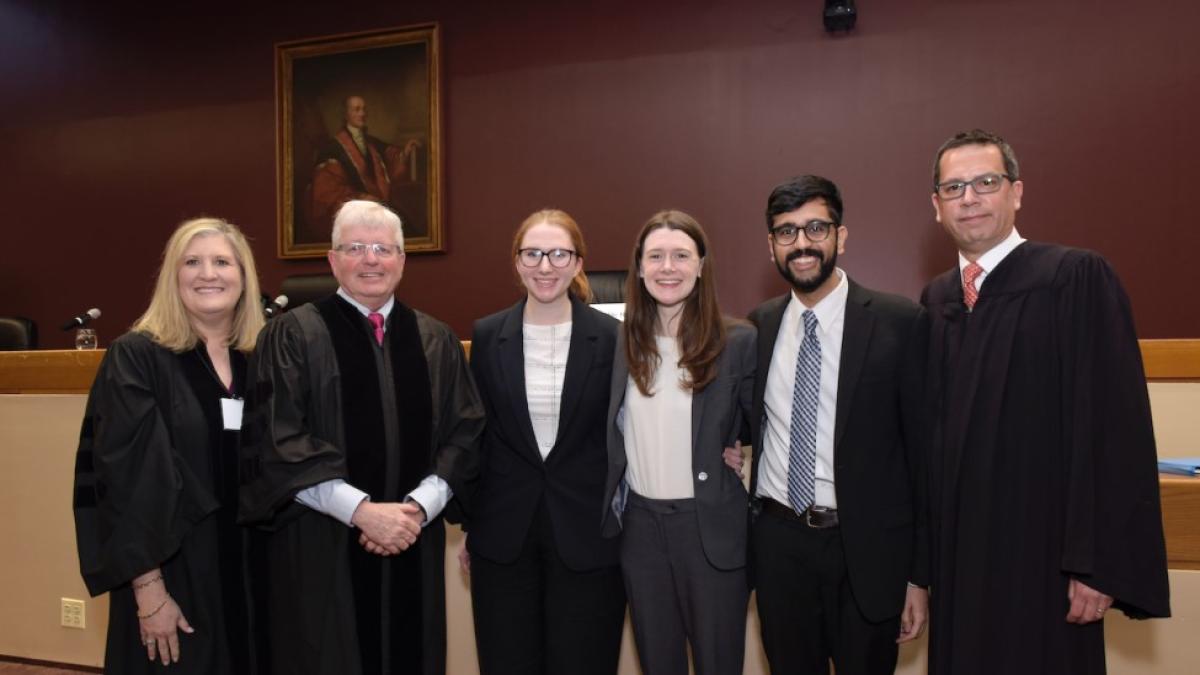
The Jeffrey G. Miller National Environmental Law Moot Court Competition (NELMCC), one of the nation’s largest interschool moot court competitions, returned in person for the first time in four years, bringing together hundreds of law students and attorney judges to the Elisabeth Haub School of Law at Pace University’s Westchester campus. Among a fierce lineup of competitors from 54 schools across the country, the University of Minnesota Law School came out on top as the 2024 NELMCC Champions. Since its founding in 1989, NELMCC has established a national standard of excellence in moot court competitions. During the pandemic, Haub Law did not skip a beat and hosted the competition virtually – allowing students to continue to participate in the highly competitive event. Each year the “Problem” presented to the teams focuses on timely issues of national importance to the practice of environmental law.
During this year’s competition, Haub Law Professor Todd Ommen challenged both teams and judges alike with a unique, timely, and complex “Problem” that compelled students to grapple with the intersection of the Natural Gas Act, the Federal Energy Regulatory Commission’s authority to impose greenhouse gas emissions mitigation conditions, the Chevron and Major Questions Doctrines, and the Religious Freedom Restoration Act. Prior to the competition, competitors research and analyze the issues presented in the environmental problem before writing persuasive arguments for one party (either the government, a public interest group, or a member of the regulated industry) advocating how the issues should be resolved. Competitors are then required to argue the issues orally for all three parties, rounding out the rigorous academic experience.
Each year, Haub Law students have the honor and responsibility of leading the competition; this year, Haub Law student Patricia McKee served as Chair. She was supported by a Haub Law student team of 30 and an additional 53 Bailiff volunteers, while Assistant Director of Pace | Haub Environmental Law, Lorraine Rubich, oversaw the competition’s successful delivery.
“Once again in person, students and judges participated from around the country – as far as Washington and California in some cases – bringing an extremely high caliber of competition and expertise with them,” said Associate Director of Environmental Law Programs at Haub Law, Achinthi C, Vithanage. “Many of our judges included past competitors and Haub Law alumni who have been returning for over 20 years as volunteers. The dynamic energy and passion of both our competitors and judges could be felt throughout the three days.”
Over the course of the three-day competition, lively discussions and panels were also held amongst coaches and judges, an environmental career session was hosted by the ABA Section of Environment, Energy, and Resources, and a CLE was hosted by Sive, Paget & Riesel. Haub Law also hosted a White Plains environmental alumni reception to coincide with the competition and allow alumni who return for the competition each year to reconnect. The preliminary and quarterfinal rounds were held on Thursday, February 22 and Friday, February 23, with the semifinal and final rounds taking place on Saturday, February 24. The final round was presided by four judges: The Honorable Aaron Avila, U.S. EPA, Environmental Appeals Board; Alexandra Dapolito Dunn, Partner, Baker Botts LLP; The Honorable Catharina Haynes, Judge of the United States Court of Appeals for the Fifth Circuit; and The Honorable Malachy E. Mannion, US District Court, Middle District of PA.
Finalist teams included University of Georgia School of Law, Boston College School of Law, and University of Minnesota School of Law. After the final round, the esteemed judges gave excellent critique and feedback to all teams. The 2024 David Sive Award for Best Brief Overall was presented to University of Arizona, James E. Rogers College of Law and the 2024 Best Oralist Award went to Asna Poonawalla at Baylor University School of Law.
The Jeffrey G. Miller National Environmental Law Moot Court Competition is grateful to the organizations and people whose generous financial support help make the event possible. This year, we were pleased to have the following major supporters: The American Bar Association (ABA) Section of Environment, Energy, and Resources (SEER), Baker Botts LLP, and AlterEcho.
Westchester County Honors Dean Horace Anderson as a “Trailblazer”
Elisabeth Haub School of Law Dean Horace E. Anderson Jr. was honored at Westchester County’s annual 2024 Trailblazers Awards Ceremony last week for his professional accomplishments and community efforts. “Trailblazers: Preserving our Legacy” was hosted live at the Gateway Center at SUNY Westchester Community College, as part of the County’s Black History Month celebration.
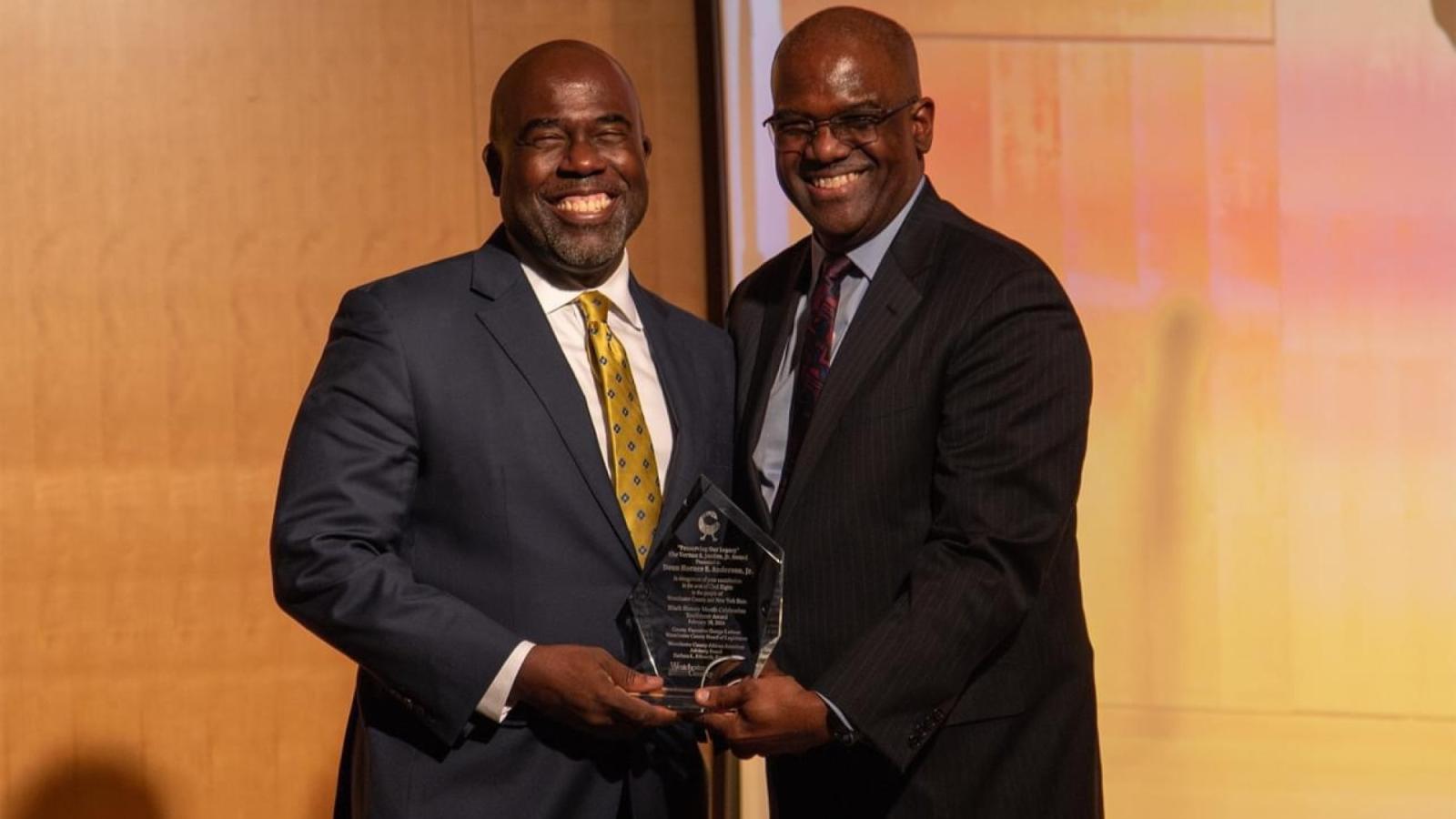
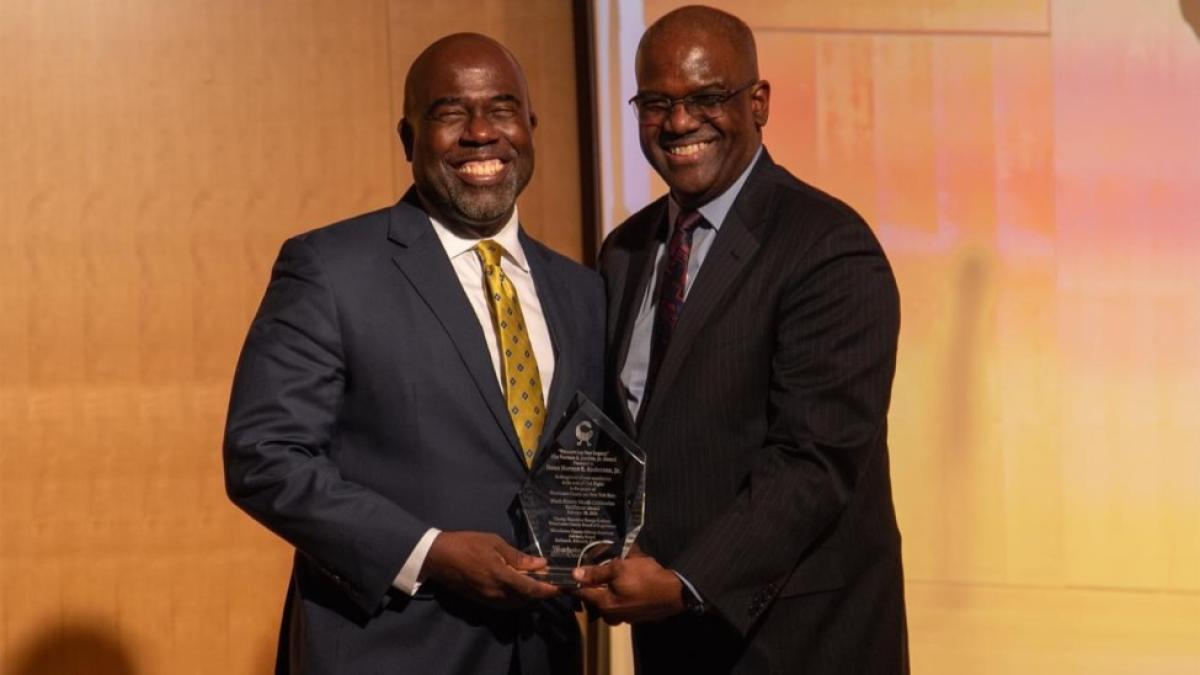
Elisabeth Haub School of Law Dean Horace E. Anderson Jr. was honored at Westchester County’s annual 2024 Trailblazers Awards Ceremony last week for his professional accomplishments and community efforts. “Trailblazers: Preserving our Legacy” was hosted live at the Gateway Center at SUNY Westchester Community College, as part of the County’s Black History Month celebration.
Dean Anderson received the Vernon E. Jordan, Jr. Award for Civil Rights created in honor of Vernon E. Jordan, Jr., a legendary and influential civil rights attorney and activist. The distinguished award demonstrates Dean Anderson’s leadership and commitment to the surrounding Westchester community through initiatives such as Haub Law’s Access to Justice project, civic education programs for youth, and expanded legal services for the community through the Law School’s centers and clinics.
Also honored was Commissioner Deborah M. Norman who received the Betty Shabazz Award for Civic Engagement and the late Drs. Kenneth and Mamie Clark, recipients of the Humanitarian Award for their historic contribution to school desegregation.
The awards were presented by Westchester County Executive George Latimer and Deputy County Executive Ken Jenkins, along with the Westchester County Board of Legislators and the Westchester County African American Advisory Board.
“The Trailblazers Awards Ceremony was created more than 20 years ago as way to honor outstanding individuals in the name of other heroic predecessors, so as not to forget their struggle and sacrifice,” said Ken Jenkins. “Tonight’s honorees have had extraordinarily successful careers along two very different paths, but they both made it a point to help guide, mentor, inspire and give back to others who followed in their footsteps.”
Watch the ceremony, including a video presentation featuring Dean Anderson:
Spring Book Preview, 'Razing Liberty Square,' ICP at 50, 'Shōgun'
NPR’s All of it with Alison Stewart: Dyson Professor Corinna Sager was interviewed on NPR’s All of it with Alison Stewart discussing a documentary she produced – ‘Razing Liberty Square’ -- about how a Miami public housing community became ground zero for climate gentrification. Watch the full documentary on PBS’s Independent Lens.
Justices' Double Jeopardy Ruling Preserves Acquittal Sanctity
Pace University Professor Lissa Griffin provides her expert opinion on the Supreme Court’s recent double jeopardy ruling and its implications for preserving acquittal sanctity in an article for Law360.
A Question of Our Time: Why Didn’t You Reply to My Email?
What can we do about this? “If you can come up with something, you’d be the next unicorn.” So says Dr. Jonathan Hill, dean of the Seidenberg School of Computer Science and Information Systems at Pace University, of my question regarding the existence, or impending development, of an alternative to email that rivals its ubiquity and ease of access. (A “unicorn,” in business contexts, refers to a startup valued at over $1 billion.)
Setters Poised to Host First Round and Quarterfinals
With the regular season behind the Northeast-10, the Pace University men's and women's basketball have entered the postseason and have earned the right to host their first game's of the postseason.
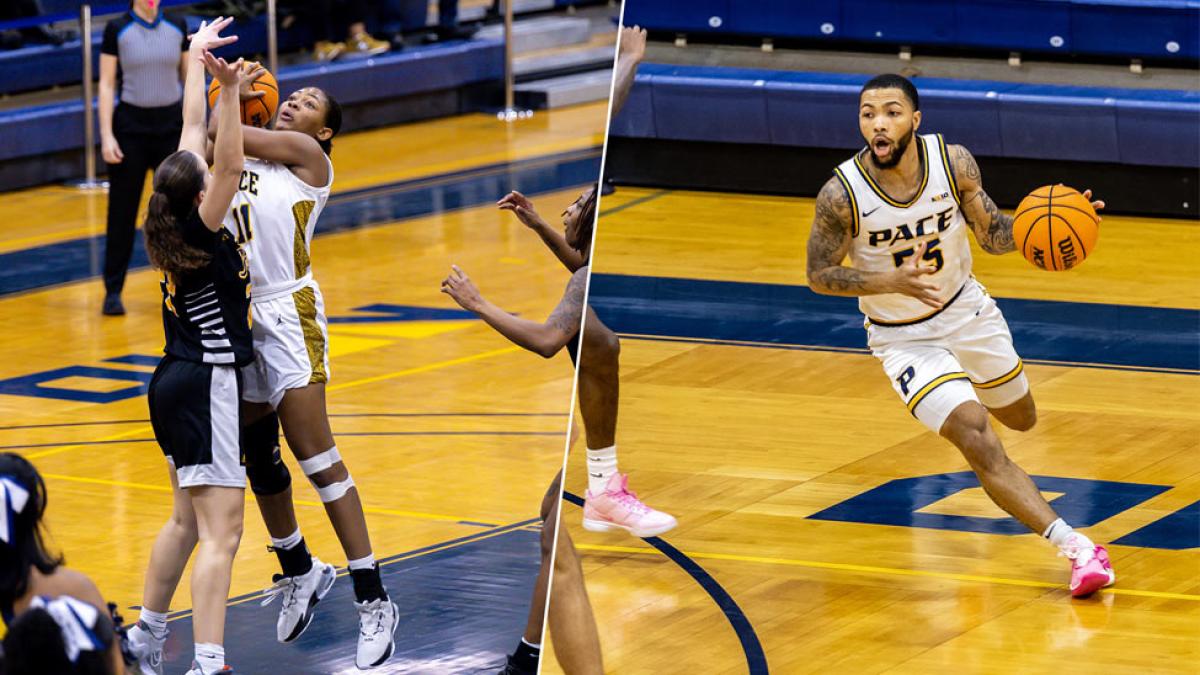
31 Colleges Across New York State Among America's Best
The Princeton Review released its 2024 "Best College" list, highlighting the 389 best colleges across the country and over 30 from New York State made the list including Pace University.
Supreme Court To Hear 2 Major Regulatory Cases Next Week
Professor Josh Galperin speaks with E&E News by POLITICO about the Supreme Court to hear a pair of cases that have the potential to upend EPA air pollution rules and disrupt regulations across a spectrum of other federal agencies.
“What if a new business pops up that wasn’t in a position to challenge the rule in the first seven years?” said Josh Galperin, an assistant law professor at Pace University.